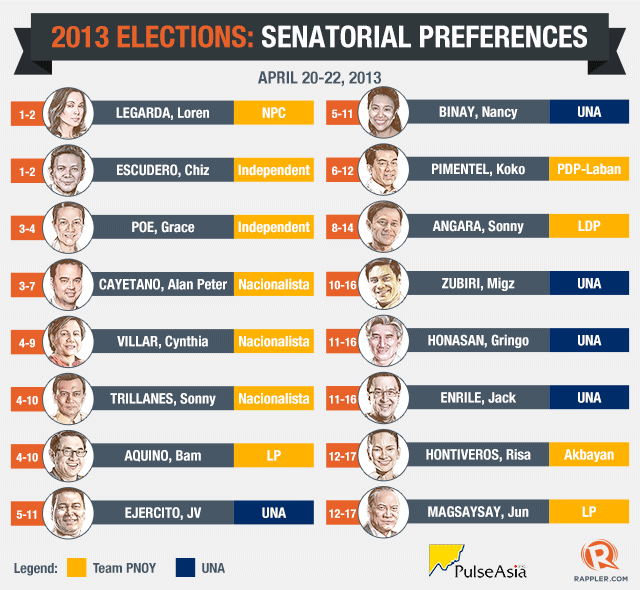SUMMARY
This is AI generated summarization, which may have errors. For context, always refer to the full article.
MANILA, Philippines – Will social media have any significant impact on the 2013 elections in the Philippines? Yes and no. Yes – in the sense of greater empowerment for voters and direct engagement. No – because there still isn’t a large enough pool in the virtual world to tip reality on election day, but a tweet or post that goes viral could dramatically derail or boost a candidate’s chances. Ignore it at your own risk.
As of now, about a third of the Philippine population has access to the Internet. More than 90% of those are on Facebook. Telecommunications companies say they expect Filipinos on the Internet to grow significantly as it moves from computers to mobile devices driven by cheaper Android phones.
For now, social media can identify advocates and force multipliers who must then be harnessed to get out the votes in the real world.
Rappler took a look at how Filipinos use social media in political dialogue, and we discovered they tend to stay insular and cliquish. #RapplerDebate’s Twitter conversations were 2 parts echo chamber and 1 part real conversation. Mapping the communities show potential points for action.
Rappler’s mood meter and mood navigator crowdsources the mood of the day, and it gives us greater insights into which events affect the way Filipinos feel. Companies and organizations around the world are increasingly interested in how people feel. It’s creating a new field called sentiment analysis, which attempts to predict emotions based on what people post on social media.
With the ability to crunch big data, computers treat social media inputs as data and use algorithms to separate positive and negative emotions based on a library of identified words.
Ci8 is a social media research agency based in Hong Kong, which focused on sentiment analysis of candidates for senator in the Philippine elections. They used a base of social media mentions using Radian6, one of the most popular monitoring software for social media used by companies around the world.
Last year, Radian6 teamed up with Twitter to analyze real-time reactions to the White House Town Hall meeting.
Still, sentiment analysis is challenging, especially since social media is dependent on nuances that a programmed dictionary will overlook. Sarcasm, for example, may be interpreted as positive sentiment.
To try to deal with some of these issues, Ci8 went a step further to try to find a more accurate reflection of Filipino voter sentiment: it manually analyzed and coded tens of thousands of posts since Feb 7, 2013, and it purposely discounted posts by the candidates and their campaigns as well as media groups.
Ci8’s individual analysis of each candidate appears on Rappler’s candidate profile pages.
The charts below show the Top 12 positive sentiment rankings and each candidate’s share of voice (the percent of that candidate’s mentions in the total conversation) in the last 3 days.
Tracking positive sentiment on Twitter over 3 months, male senatorial candidates outnumber women, 8-4. But 3 of the top 5 are women: Hontiveros, Poe and Villar.
If you compare the all-time positive sentiment list (February 7 to present) to last week’s list, the Top 12 changed little except for the introduction of Jack Enrile last week. Sonny Angara, meanwhile, is 12th overall but dropped from last week’s Top 12 list.
How does this compare to a real world representational survey with a declared margin of error?
If we compare the Pulse Asia survey for April 20-22 to last week’s positive sentiment results, 9 of the 12 on the positive sentiment list are on Pulse Asia’s Top 16 list. A total of 3 names on positive sentiment list don’t appear on Pulse Asia’s list: Eddie Villanueva, Teddy Casiño and Richard Gordon.

Loren Legarda, who tied for 1st place in Pulse Asia’s survey is not on the positive sentiment Top 12. Neither are Alan Peter Cayetano and Sonny Trillanes.
What impact has social media had on the candidates? Let’s look at specific examples.
Positive sentiment for Cynthia Villar hit an all-time high in the first week of March with 551,950 positive mentions but dipped after her “room nurse” comment, which went viral on social media. Villar hasn’t recovered but is still in the Top 12.
Risa Hontiveros enjoyed a steep climb that began on April 14 and hit 779,420 positive mentions the week of April 21-27. So did Teddy Casiño who hit 610,420 mentions that same week. This same increase is recorded in the analysis of the #RapplerDebate on April 15.
Consistently in the Top 5 is Eddie Villanueva. Grace Poe and Richard Gordon recorded steep climbs the week of April 28-May 4.
Sentiment analysis shows social media is a potent tool that can’t be ignored. In the 2010 elections, there was a large disconnect between the virtual and physical worlds, largely because of Internet penetration. That gap has decreased immensely 3 years later with a vibrant, engaged community that has supported legislation and come together to challenge and derail the cybercrime law.
The more exciting challenge is how politicians and an engaged civic society will harness this tool in the coming years leading to the 2016 presidential elections.– Rappler.com
Visit #PHvote, Rappler’s coverage of the 2013 Philippine elections. Get to know the candidates through our comprehensive profile pages.
Share this page and pledge to #votesmart by clicking on the button below.
|
|
|
|
|
Add a comment
How does this make you feel?
There are no comments yet. Add your comment to start the conversation.